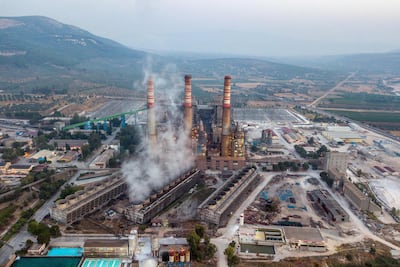Climate scientists are working on an AI bot that puts a world of knowledge at people's fingertips about the race to go green.
Known as ChatNetZero, it is designed to sift through wordy climate plans – and deliver blunt verdicts.
The launch is planned for next month’s New York Climate Week, while world leaders are gathering at UN headquarters.
It is being developed by AI company Arboretica, research lab Data-Driven EnviroLab and researchers behind the Net Zero Tracker project.
Angel Hsu, the research lab’s founder, on Thursday said the app would be the “next evolution” of applying AI to climate science.
A contributor to the Intergovernmental Panel on Climate Change that issues dire warnings about the planet, she said the aim was to improve on existing tools such as ChatGPT.
Scientists have tried asking those existing apps to analyse net-zero pledges but “we were incredibly disappointed with the results”, she told an event hosted by Climate Change AI.
A live demo of ChatNetZero will be presented to a group called Climate Action Data 2.0 during New York Climate Week on September 22. A limited number of beta testers will also get access to a pilot launch the week before by applying on the app's website.
Users will be able to ask it about countries and companies' climate policies.
“We are developing a fine-tuned, specific large language model to help demystify net-zero commitments,” she said.
In one example, ChatGPT gave a fence-sitting answer when asked whether reliance on fossil fuels undermines a net-zero pledge. ChatNetZero stated forthrightly that such a plan “is not pledging net zero credibly”.
Scientists are seeking funding to develop the new app, which was able to give specific answers on climate commitments by the US, Afghanistan, Nepal, Walmart and Amazon.
The aim is that users will eventually be able to upload documents such as new corporate climate plans and run them under ChatNetZero’s nose.
“A large volume of text is now available but it’s cumbersome to manually read and code,” Dr Hsu said.
“We need to really understand how large language models can help in this space.”
Dr Hsu also backed AI to take a good guess at measuring emissions from countries or companies that are unwilling to share data.
Findings in June by Net Zero Tracker found the number of major companies setting green targets had doubled since 2020 – but analysts said many lacked transparency on emissions, making them “largely meaningless”.
Another recent report said only a third of the UK's corporate carbon emissions were covered by net-zero plans.
Scientists have used AI to crunch existing figures and try to fill the gaps, although Ms Hsu said the training data came mainly from Europe and that it was not always certain why emissions were falling.
“We have to be looking more towards hybrid approaches, which include integration of machine-learning approaches to fill in these greenhouse gas emissions gaps,” she said.
“You can’t manage what you don’t measure. We can’t make solid decisions if we don’t know whether emissions are actually coming down as a result of our policies."
Benefits of first-time home buyers' scheme
- Priority access to new homes from participating developers
- Discounts on sales price of off-plan units
- Flexible payment plans from developers
- Mortgages with better interest rates, faster approval times and reduced fees
- DLD registration fee can be paid through banks or credit cards at zero interest rates
SPECS
%3Cp%3E%3Cstrong%3EEngine%3C%2Fstrong%3E%3A%202-litre%20direct%20injection%20turbo%20%0D%3Cbr%3E%3Cstrong%3ETransmission%3C%2Fstrong%3E%3A%207-speed%20automatic%20%0D%3Cbr%3E%3Cstrong%3EPower%3C%2Fstrong%3E%3A%20261hp%20%0D%3Cbr%3E%3Cstrong%3ETorque%3C%2Fstrong%3E%3A%20400Nm%20%0D%3Cbr%3E%3Cstrong%3EPrice%3C%2Fstrong%3E%3A%20From%20Dh134%2C999%26nbsp%3B%3C%2Fp%3E%0A
RedCrow Intelligence Company Profile
Started: 2016
Founders: Hussein Nasser Eddin, Laila Akel, Tayeb Akel
Based: Ramallah, Palestine
Sector: Technology, Security
# of staff: 13
Investment: $745,000
Investors: Palestine’s Ibtikar Fund, Abu Dhabi’s Gothams and angel investors
Emergency phone numbers in the UAE
Estijaba – 8001717 – number to call to request coronavirus testing
Ministry of Health and Prevention – 80011111
Dubai Health Authority – 800342 – The number to book a free video or voice consultation with a doctor or connect to a local health centre
Emirates airline – 600555555
Etihad Airways – 600555666
Ambulance – 998
Knowledge and Human Development Authority – 8005432 ext. 4 for Covid-19 queries
UAE currency: the story behind the money in your pockets
Ten tax points to be aware of in 2026
1. Domestic VAT refund amendments: request your refund within five years
If a business does not apply for the refund on time, they lose their credit.
2. E-invoicing in the UAE
Businesses should continue preparing for the implementation of e-invoicing in the UAE, with 2026 a preparation and transition period ahead of phased mandatory adoption.
3. More tax audits
Tax authorities are increasingly using data already available across multiple filings to identify audit risks.
4. More beneficial VAT and excise tax penalty regime
Tax disputes are expected to become more frequent and more structured, with clearer administrative objection and appeal processes. The UAE has adopted a new penalty regime for VAT and excise disputes, which now mirrors the penalty regime for corporate tax.
5. Greater emphasis on statutory audit
There is a greater need for the accuracy of financial statements. The International Financial Reporting Standards standards need to be strictly adhered to and, as a result, the quality of the audits will need to increase.
6. Further transfer pricing enforcement
Transfer pricing enforcement, which refers to the practice of establishing prices for internal transactions between related entities, is expected to broaden in scope. The UAE will shortly open the possibility to negotiate advance pricing agreements, or essentially rulings for transfer pricing purposes.
7. Limited time periods for audits
Recent amendments also introduce a default five-year limitation period for tax audits and assessments, subject to specific statutory exceptions. While the standard audit and assessment period is five years, this may be extended to up to 15 years in cases involving fraud or tax evasion.
8. Pillar 2 implementation
Many multinational groups will begin to feel the practical effect of the Domestic Minimum Top-Up Tax (DMTT), the UAE's implementation of the OECD’s global minimum tax under Pillar 2. While the rules apply for financial years starting on or after January 1, 2025, it is 2026 that marks the transition to an operational phase.
9. Reduced compliance obligations for imported goods and services
Businesses that apply the reverse-charge mechanism for VAT purposes in the UAE may benefit from reduced compliance obligations.
10. Substance and CbC reporting focus
Tax authorities are expected to continue strengthening the enforcement of economic substance and Country-by-Country (CbC) reporting frameworks. In the UAE, these regimes are increasingly being used as risk-assessment tools, providing tax authorities with a comprehensive view of multinational groups’ global footprints and enabling them to assess whether profits are aligned with real economic activity.
Contributed by Thomas Vanhee and Hend Rashwan, Aurifer
RESULTS
1.45pm: Maiden Dh75,000 1,400m
Winner: Dirilis Ertugrul, Fabrice Veron (jockey), Ismail Mohammed (trainer)
2.15pm: Handicap Dh90,000 1,400m
Winner: Kidd Malibu, Sandro Paiva, Musabah Al Muhairi
2.45pm: Maiden Dh75,000 1,000m
Winner: Raakezz, Tadhg O’Shea, Nicholas Bachalard
3.15pm: Handicap Dh105,000 1,200m
Winner: Au Couer, Sean Kirrane, Satish Seemar
3.45pm: Maiden Dh75,000 1,600m
Winner: Rayig, Pat Dobbs, Doug Watson
4.15pm: Handicap Dh105,000 1,600m
Winner: Chiefdom, Royston Ffrench, Salem bin Ghadayer
4.45pm: Handicap Dh80,000 1,800m
Winner: King’s Shadow, Richard Mullen, Satish Seemar
What is graphene?
Graphene is extracted from graphite and is made up of pure carbon.
It is 200 times more resistant than steel and five times lighter than aluminum.
It conducts electricity better than any other material at room temperature.
It is thought that graphene could boost the useful life of batteries by 10 per cent.
Graphene can also detect cancer cells in the early stages of the disease.
The material was first discovered when Andre Geim and Konstantin Novoselov were 'playing' with graphite at the University of Manchester in 2004.
SERIE A FIXTURES
Friday Sassuolo v Torino (Kick-off 10.45pm UAE)
Saturday Atalanta v Sampdoria (5pm),
Genoa v Inter Milan (8pm),
Lazio v Bologna (10.45pm)
Sunday Cagliari v Crotone (3.30pm)
Benevento v Napoli (6pm)
Parma v Spezia (6pm)
Fiorentina v Udinese (9pm)
Juventus v Hellas Verona (11.45pm)
Monday AC Milan v AS Roma (11.45pm)
Living in...
This article is part of a guide on where to live in the UAE. Our reporters will profile some of the country’s most desirable districts, provide an estimate of rental prices and introduce you to some of the residents who call each area home.
The Perfect Couple
Starring: Nicole Kidman, Liev Schreiber, Jack Reynor
Creator: Jenna Lamia
Rating: 3/5
Ain Dubai in numbers
126: The length in metres of the legs supporting the structure
1 football pitch: The length of each permanent spoke is longer than a professional soccer pitch
16 A380 Airbuses: The equivalent weight of the wheel rim.
9,000 tonnes: The amount of steel used to construct the project.
5 tonnes: The weight of each permanent spoke that is holding the wheel rim in place
192: The amount of cable wires used to create the wheel. They measure a distance of 2,4000km in total, the equivalent of the distance between Dubai and Cairo.



